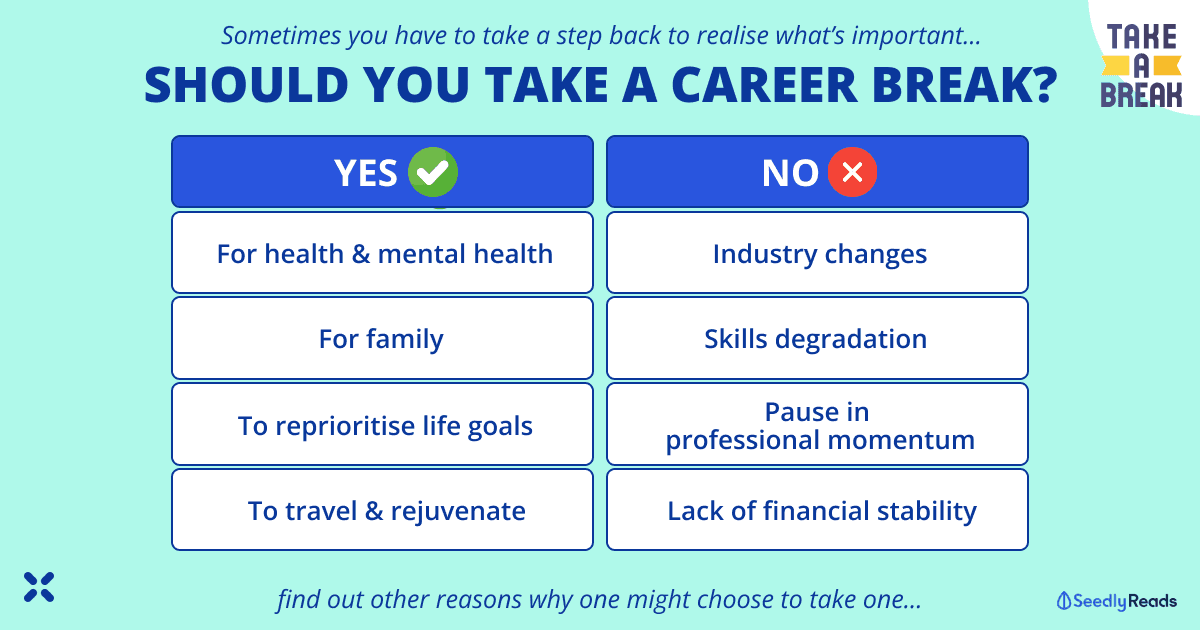“I think I just need this break to rejuvenate myself and come back stronger.”
A recent heart-to-heart with a friend sparked a profound realisation: life extends beyond the confines of work.
Her decision to resign after six years of toil prompted me to ponder over our shared experiences of work frustrations.
It became evident that her situation wasn’t unique when I chanced upon news articles highlighting a growing number of Singaporeans sharing similar sentiments.
According to the Singapore Counselling Centre, more individuals are considering taking career breaks.
In this article, I explore this trend — an act not driven by external pressures but rather by the intrinsic need for rest, self-nurturing and fulfilment, and why it is crucial in today’s work setting.

TL;DR: When Should You Take a Career Break, Why Should You Take a Career Break?
Click here to jump:
- Who takes a career break?
- Why do people take a career break?
- How to take a career break?
- Can you go back to the workforce after the break?
Who Takes a Career Break?
Work is no longer the sole focus, as trends like job hopping and lazy girl jobs have taken workplaces by storm. Many employees, particularly younger Singaporeans, are now choosing to minimise work or take extended breaks.
COVID-19 was a poignant reminder that work cultures and settings evolve over time, and attitudes towards careers, have changed.
Besides a hectic workload, younger Singaporeans face multiple issues at once – rising costs, rising property prices, fewer savings due to higher cost of living, and a highly competitive job market.
If you ask me if I had thought about taking a career break at this point in my life, I have not. But within my social circle, a few (including the friend I’ve mentioned above) are already considering it.
Why Do People Take a Career Break?
Taking extended breaks from work has become increasingly common, not only for pressing reasons such as health issues or caregiving responsibilities but also for personal pursuits.
Many reasons include rest, family time, skills enhancement, volunteering, or travel.
Health & Mental Health as a Priority
According to a survey by JobStreet, 58% of Singaporean employees feel burnt out at work.
This concerning trend is particularly prevalent among young professionals, highlighting the need to address it before it escalates.
We know that burnout diminishes productivity and job satisfaction physically and, in some severe cases, impacts you mentally.
Amidst the growing awareness surrounding mental health and burnout, today’s youth are more vigilant in identifying early signs of burnout and are proactive in implementing measures to mitigate its impact.
Recognising the detrimental effects, taking a career break is a viable strategy to counter burnout and rejuvenate oneself.
I think this can be captured aptly by this Chinese idiom: 休息是为了走更长远的路, which translates to “a rest is only the first step of a longer journey ahead.”
By allowing oneself to recharge and recuperate, you can replenish your physical, mental, and emotional resources, enabling you to tackle challenges with renewed vigour and resilience.

Seeking Out New Opportunities & Realign Priorities
Career breaks also allow one to explore new opportunities.
Many professionals take career breaks to pursue further education, travel, or start businesses. These experiences can help them gain new skills and perspectives that they can bring back to their careers.
However, what are the implications of taking such breaks for self-serving reasons? Will a long break negatively impact one’s career?
A career gap might raise concerns among some employers regarding the readiness and relevance of skills and experience.
However, some see breaks as opportunities for personal growth and skill acquisition.
What Should One Consider Before Taking a Career Break?
Before deciding, evaluate your readiness, financial stability, family support, break duration, planned activities, and skill development opportunities.
While a break is a break, it’s advisable to have a plan for it as it helps you prepare mentally – most importantly, there’s something you can follow through until you find the next job.
Is It Advisable to Take a Long Career Break?
Understanding the purpose behind the break is crucial.
Yes, taking a break from work can offer valuable perspective on both career and life, so one tip is to set a timeframe to focus on your goals and define your future plans if you have one.
Can You Go Back to the Work Force After the Break?
Of course, you can! Whenever you’re ready.
How Should a Career Break Be Positioned on a Resume?
This break is essential to you, and you will need to emphasise the reasons and how it contributed to your personal and professional development.
The key is to address it openly and express how it has helped you.
Any Advice for Rejoining the Workforce After a Long Break?
Stay connected with your network and professional circle and updated with news and work trends.
Most importantly, don’t give up even if you get rejected on the first try.
For the uninitiated, it was announced during Budget 2024 that those who are 40 and above will receive a $4,000 top-up to your SkillsFuture account from May, so take this chance if you can.
Otherwise, you can prioritise upskilling to stay competitive in today’s dynamic job market.
Afterthoughts
Taking a career break provides a valuable opportunity for individuals to step back, reflect, and explore new paths.
Whether it leads to a change in career direction, personal growth, or simply a renewed sense of purpose, embracing the possibilities that come with time away from work can be a transformative experience.
Related Articles:
- 7 Signs of a Toxic Workplace and How To Deal With It
- Don’t Build a Career Path, Build a Career Portfolio!
- Salary Guide Singapore (2023) Across Industries: Are You Paid Enough?
- Stressed at Work? Here Are 9 Free AI Tools Everyone Should Try!
- Latest Fresh Graduate Salary Guide (2024) Based on Graduate Employment Survey (GES) 2023
Advertisement

